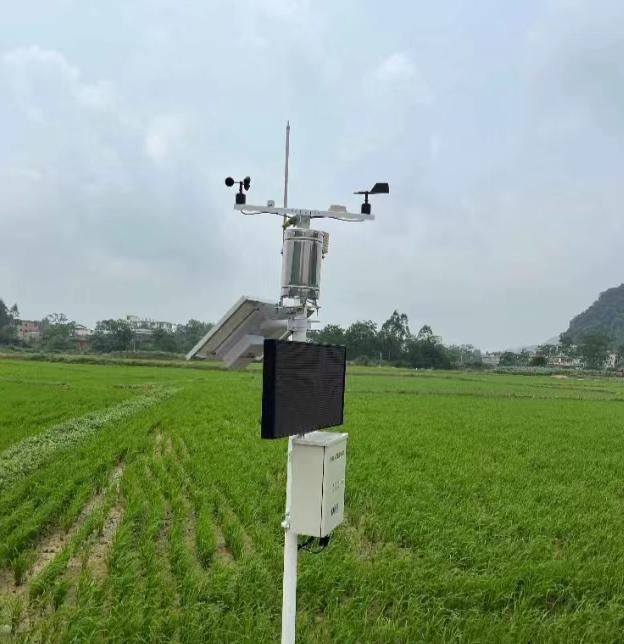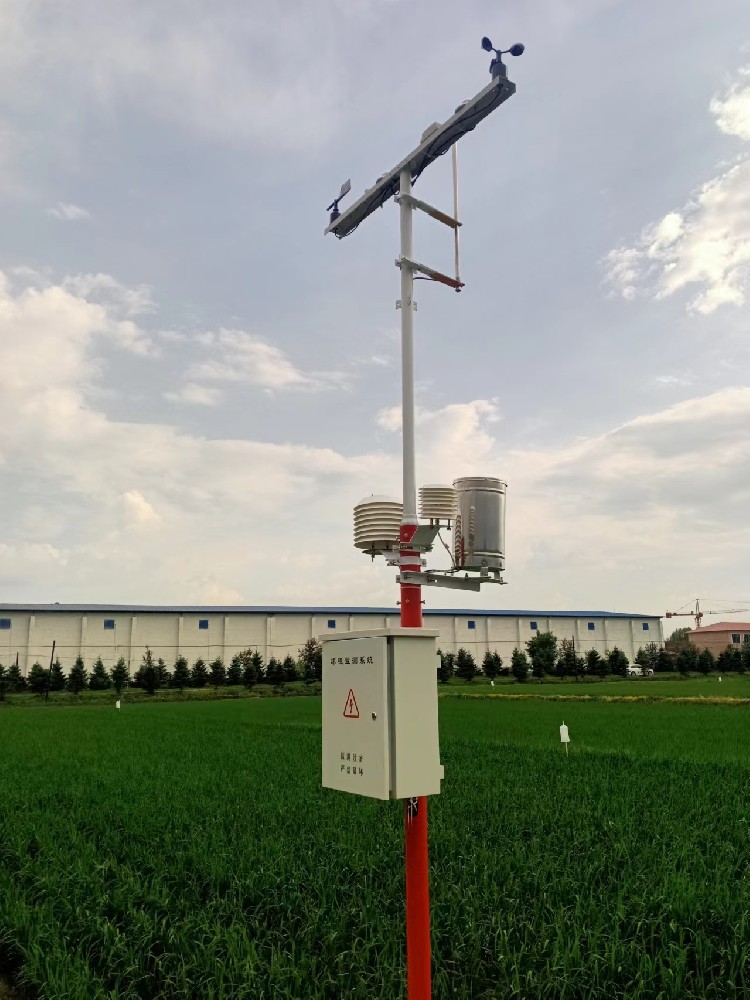

— Blogs —
—Products—
 Consumer hotline +8618073152920
Consumer hotline +8618073152920 WhatsApp:+8615367865107
Address:Room 102, District D, Houhu Industrial Park, Yuelu District, Changsha City, Hunan Province, China
Product knowledge
Time:2024-08-18 21:47:10 Popularity:1374
Agricultural meteorology is a science that studies the interaction of meteorological conditions with agricultural production and their patterns. It is concerned with how natural meteorological elements, such as light, temperature, moisture, atmospheric pressure and carbon dioxide concentration, affect crop growth and development, animal health, the occurrence of pests and diseases, and the entire agricultural production process. This includes every aspect of the process from seeding and growth management to harvesting and storage. The task of agrometeorology is to gain a deeper understanding of the spatial and temporal distribution patterns of these natural conditions, and to provide a scientific basis for agricultural zoning, crop layout, artificial regulation of microclimates, agrometeorological forecasting, and advisory services. Through these studies, agrometeorologists help farmers to rationalize the use of climate resources, such as through precision agriculture techniques to adapt to climate change, avoid adverse weather events, increase crop yields, reduce costs, and enhance the economic and environmental sustainability of agriculture.

In addition, agrometeorology involves assessment of agroclimatic resources, risk management of agrometeorological disasters, improvement of farmland microclimate, and optimization of crop growing environment through modern technologies such as smart greenhouse control systems to automate and smarten agricultural production. These researches and applications not only improve the efficiency of agricultural production, but also promote the green development of agriculture and its adaptability to extreme weather events.
Agricultural meteorology plays a crucial role in agricultural production, and its importance is mainly reflected in the following aspects:
I. Influence the growth and development of crops and yields
1. Direct influence of climatic conditions: Agricultural meteorological factors such as temperature, light, precipitation, etc. directly affect the growth and development of crops. For example, suitable temperature and light conditions can promote crop photosynthesis and increase yields; while excessively high temperatures or prolonged droughts may lead to crop yield reduction or even death.
2. Growth cycle adjustment: Farmers need to adjust their cropping plans to the agro-meteorological forecasts in order to adapt to the effects of climate change on the crop growth cycle. This helps to ensure that crops are grown under optimal climatic conditions, thereby improving yield and quality.
II. Guidance on irrigation and fertilization
1. Rational irrigation: Agrometeorology helps farmers determine whether irrigation is needed and the optimal time and amount of water to irrigate by examining information such as rainfall conditions and soil moisture evaporation rates. This helps to avoid wasting water while ensuring that crops are supplied with sufficient water.
2. Scientific fertilization: Agrometeorological conditions also affect soil fertility and nutrient uptake and utilization. By understanding agro-meteorology, farmers can apply fertilizers wisely to improve soil fertility and crop nutrient uptake efficiency, thereby increasing yields.

III. Prediction and control of pests and diseases
1. Pest and disease monitoring: agrometeorology can predict the occurrence and spread of pests and diseases and provide farmers with timely and effective prevention and control recommendations. For example, high temperature and high humidity are conducive to the reproduction and spread of certain pests and diseases, and farmers can take appropriate control measures according to the weather forecast.
2. Reducing losses: By predicting and controlling pests and diseases, farmers can reduce crop losses and improve the economic efficiency of agricultural production.
IV. Promoting agricultural zoning and planning
1. Resource utilization: Agricultural meteorology studies the spatial and temporal distribution patterns of agricultural natural resources and agricultural natural disasters, providing a scientific basis for agricultural zoning and planning. This helps to rationally utilize climate resources, avoid unfavorable meteorological factors and promote sustainable agricultural development.
2. Crop layout: according to the agrometeorological conditions, farmers can reasonably choose crop varieties and planting areas, to achieve the optimization of crop layout and maximize the benefits of agricultural production.
V. Enhancing Agricultural Economic Benefits
1. Reduce costs: through the rational use of agro-meteorological information, farmers can reduce unnecessary inputs (e.g., irrigation, fertilization, etc.), thus reducing production costs.
2. Increase income: Improving the yield and quality of crops will help increase farmers' income and enhance agricultural economic benefits.
VI. Impacts in other aspects
1. Improving productivity and crop quality: By monitoring and analyzing meteorological conditions, farmers are able to adjust their planting strategies, such as timely sowing, irrigation, and fertilizer application, based on data on temperature, humidity, and light, thereby improving crop yield and quality. The use of agrometeorological stations allows farmers to access this critical information in a timely manner and manage their farmland scientifically.
2. Cornerstone of precision agriculture: In smart agriculture, agrometeorological data is the foundation for the implementation of precision agriculture. Through IoT technology, microclimate weather environment monitoring stations can monitor the farmland environment in real time, provide the most suitable growing conditions for crops, and realize the efficient use of resources.
3. Promoting green development of agriculture: Through precise meteorological information, water use can be optimized, excessive use of chemical fertilizers and pesticides can be reduced, the burden of agriculture on the environment can be lowered, and the development of recycling agriculture and eco-agriculture can be promoted.
4. Policy formulation and risk management: agrometeorological data support governments and related organizations in formulating agricultural policies, such as insurance policies and disaster relief programs, to help farmers manage risks effectively.
In summary, agrometeorology is not only related to the technological progress of agricultural production, but also a key factor in guaranteeing national food security and promoting the sustainable development of rural economy. Through the integration of modern technology, agrometeorology is becoming an important bridge connecting the natural environment and agricultural production. Therefore, farmers and agricultural practitioners should pay close attention to agrometeorological information and make scientific use of agrometeorological resources in order to realize the sustainable development of agricultural production.
Related recommendations
Sensors & Weather Stations Catalog
Agriculture Sensors and Weather Stations Catalog-NiuBoL.pdf
Weather Stations Catalog-NiuBoL.pdf
Related products
 Combined air temperature and relative humidity sensor
Combined air temperature and relative humidity sensor Soil Moisture Temperature sensor for irrigation
Soil Moisture Temperature sensor for irrigation Soil pH sensor RS485 soil Testing instrument soil ph meter for agriculture
Soil pH sensor RS485 soil Testing instrument soil ph meter for agriculture Wind Speed sensor Output Modbus/RS485/Analog/0-5V/4-20mA
Wind Speed sensor Output Modbus/RS485/Analog/0-5V/4-20mA Tipping bucket rain gauge for weather monitoring auto rainfall sensor RS485/Outdoor/stainless steel
Tipping bucket rain gauge for weather monitoring auto rainfall sensor RS485/Outdoor/stainless steel Pyranometer Solar Radiation Sensor 4-20mA/RS485
Pyranometer Solar Radiation Sensor 4-20mA/RS485
Screenshot, WhatsApp to identify the QR code
WhatsApp number:+8615367865107
(Click on WhatsApp to copy and add friends)